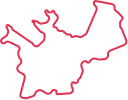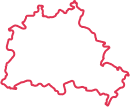In order to receive real-time traffic alerts, locate destinations quickly, and avoid getting lost, drivers utilize both online and offline GPS navigators. The ability to detect a user’s location has become ubiquitous in mobile applications, ranging from dating apps to travel apps to gaming apps.
This article will explore the various types of apps that incorporate GPS features, the technologies employed to make a secure GPS app, and a comprehensive, step-by-step guide on how to create GPS app.
What is GPS App?
A GPS app, short for Global Positioning System application, is a type of software that employs GPS technology to identify a user’s whereabouts and offer an array of location-based services. GPS apps have a wide range of uses, from navigation and tracking to geocaching and more. These apps are typically available on mobile devices, like smartphones and tablets, and are frequently combined with additional features, such as maps, directions, and points of interest. Some of the most widely used GPS apps include Google Maps, Waze, and Garmin Connect.
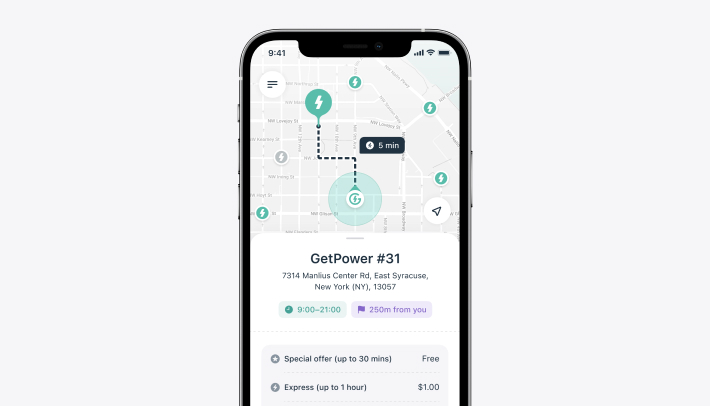
Let’s move on in our guide on how to build a navigation app!
What Types of Apps Use GPS Features?
The MarketsandMarkets report forecasts that the revenue derived from location-based applications will reach $40 billion by 2024. Surprisingly, even apps that you may not anticipate as having GPS functionality are now employing advanced user experiences via GPS-tracking. From food ordering apps to job-searching platforms, an increasing number of app types utilize GPS features to provide enhanced services. If you’re wondering how to build a GPS app, let’s take a closer look at some of the apps currently available in the market that utilize GPS features.
Retail Industry Applications
Retail giants like Walmart, Costco, and Target, among others, utilize geolocation tracking features in their applications to enhance sales and improve customer experiences. GPS data enables them to display nearby supermarkets, generate promotions and special offers, and deliver notifications, thereby keeping customers informed at all times. Additionally, retailers like Target, Amazon, and iHerb provide home delivery and international shipping options, with GPS sensors identifying a user’s location and requesting approval to deliver to that address. Food delivery services also fall within the realm of retailers, with online food delivery app is projected to reach US$0.91tn in 2023, as per a Statista report. Such applications allow users to search for desired cuisines or specific restaurants and track their order delivery in real-time.
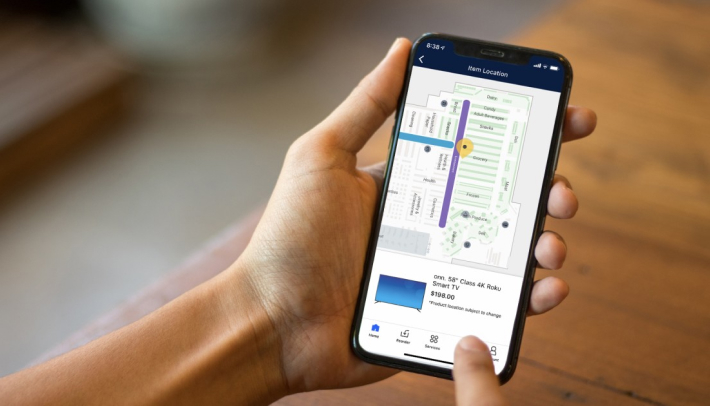
On-Demand Platforms
One of the most prominent on-demand services is undoubtedly taxi-hailing, particularly through Uber. Upon requesting a ride, the app identifies available drivers in the vicinity based on the user’s geolocation. Users can quickly ascertain a driver’s location, estimated arrival time, and travel duration. In addition to benefiting users, Uber also provides significant assistance to its drivers. The mobile application generates the quickest route, leveraging satellite data to assist drivers in avoiding traffic.
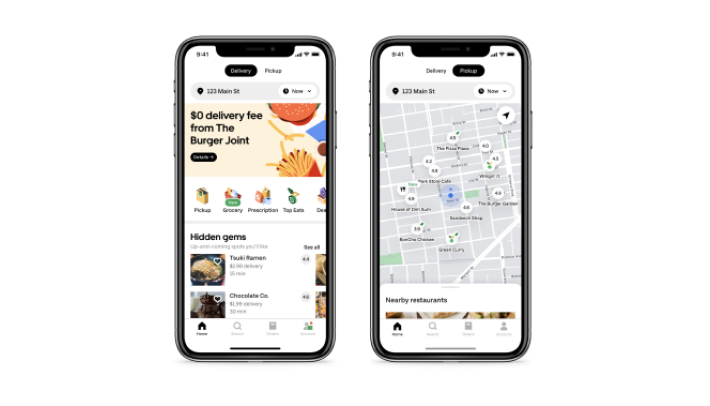
Games and AR Applications
The gaming industry was expected to reach $159.3 billion in 2022 and is anticipated to surpass $200 billion by 2023. Users can download games on their mobile devices (running Android, iOS, and Windows operating systems) or computers. One of the key advantages of incorporating a GEO tracker in the gaming industry is that it enables players to find other gamers nearby or across the globe, facilitating real-time gameplay. App owners can also analyze the location data of their users to refine their marketing strategies and broaden their audience, ultimately leading to increased sales and revenue.
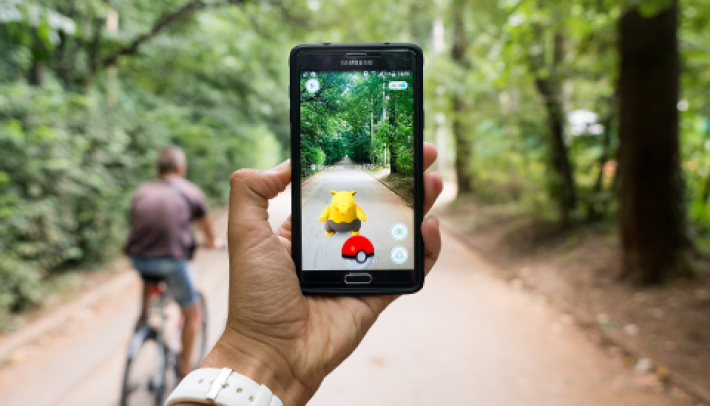
Geosocial Applications
Social media has become an integral aspect of people’s lives worldwide, with 2.95 billion users spending a significant amount of time on social media platforms in 2019. This number is projected to rise to 3.43 billion by 2023. Facebook leverages a user’s location data to suggest local events, such as exhibitions, concerts, and fairs. Foursquare assists users in discovering nearby dining options, leaving feedback, and checking in to locations to meet up with friends. Dating apps employ location data to match users with potential partners situated in close proximity.
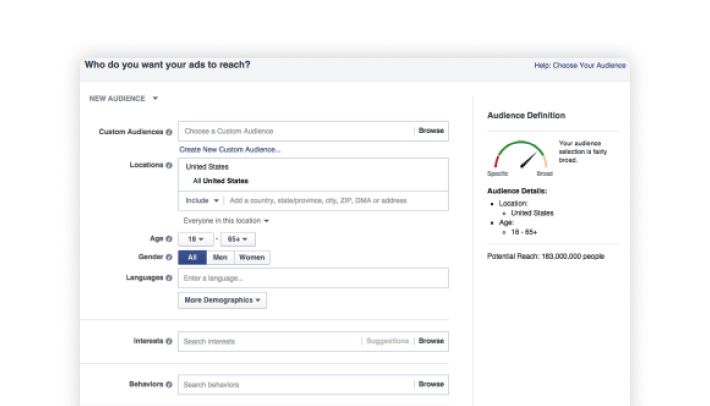
GPS App Challenges
Developing a successful location-based app is a challenging task that requires careful consideration of various factors, including how to build a GPS app that will impress users and keep them engaged over the long term. One of the main challenges is how to create GPS app that will impress users and keep them engaged over the long term. Statistics indicate that only one in three users will return to an app after downloading it, while one in four visitors abandons an app after just one use. This means that GPS app developers have only one chance to make a great first impression and showcase the functionality of their product.
One of the biggest success stories in the GPS app market is Waze, a geolocation application launched in 2008 as “LinQmap.” Waze quickly gained popularity and attracted $55 million in funding before being acquired by Google in 2013 for $1.1 billion. To achieve similar levels of success, GPS app developers must address the deeper challenges that underlie the development of such applications. Here are some challenges to avoid if you want to know how to make a GPS tracking app properly.
Accuracy
One of the most significant challenges faced by GPS apps is ensuring accurate location information. GPS signals can be affected by various factors, including weather, buildings, and other obstacles. This can result in inaccurate location data, which can impact the user experience and the app’s functionality. GPS app developers need to implement measures such as signal boosting and filtering to ensure that the app provides accurate location information.
Battery Drain
Another significant challenge faced by GPS apps is battery drain. This technology requires a lot of power, and continuous use of the GPS app can quickly drain a device’s battery. GPS app developers need to optimize their app’s power usage to ensure that it does not consume too much power and drain the device’s battery.
Signal Loss
GPS signals can be lost in areas with poor network coverage, such as remote or rural areas. This can result in a loss of location data, leading to inaccurate or incomplete information. GPS app developers need to implement measures such as caching and offline mode to ensure that their app can still function in areas with poor network coverage.
Security
GPS apps often require access to the user’s location data, which can raise security concerns. Users may be hesitant to grant access to their location data, fearing that their privacy may be compromised. GPS app developers need to implement robust security measures to ensure that user data is protected from unauthorized access or breaches.
User Interface
The user interface of a GPS app is crucial for user engagement and satisfaction. A poorly designed UI can lead to a frustrating user experience, resulting in low app usage and poor ratings. GPS app developers need to invest in designing an intuitive and user-friendly UI to ensure that their app is well-received by users.
Data Consumption
GPS apps require a lot of data to function correctly, including maps, location data, and other related information. This can result in high data consumption of Internet traffic, which can be costly for users with limited data plans. GPS app developers need to optimize their app’s data usage to ensure that it consumes minimal data while still providing accurate location information.
Integration with Other Services
GPS apps may need to integrate with other services such as payment gateways, social media platforms, or third-party APIs. This can be challenging as it requires expertise in different programming languages and development tools. GPS app developers need to have a deep understanding of the various integration options and implement them seamlessly to provide a complete user experience.
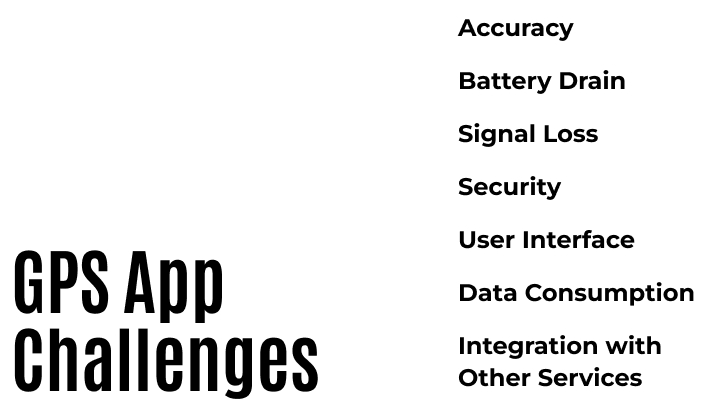
Technology Used in GPS App Development
In our guide on how to make a navigation app, we also decided to describe a variety of technologies to create GPS app, each with its own unique advantages and disadvantages. Here is an overview of some of these technologies:
GPS
This technology uses visible satellites to determine a user’s location and display it accurately. It can detect location anywhere, even in remote or wooded areas, because the sky is filled with satellites.
Cell-ID
This technology reads information from local cell towers to display location data. The speed of data display depends on the number of devices used in the area by the tower. It is less commonly used because the radio signal coverage of cell towers can be weak outside densely populated areas.
A-GPS (Assisted GPS)
This technology is a combination of GPS and Cell-ID. Together, they provide more accurate data than when used separately. A-GPS is ideal for improving the accuracy of GPS navigation.
Geofencing
This technology uses GPS to determine a user’s proximity to a particular location. It is primarily used in advertising to display ads for local goods and services. When you travel to another country and turn on your cellular data, you may receive ads and offers from local businesses.
iBeacon and Eddystone
These technologies developed by Apple and Google use Bluetooth Low Energy signals to provide highly accurate indoor navigation. However, they only work in conjunction with the core functionality.
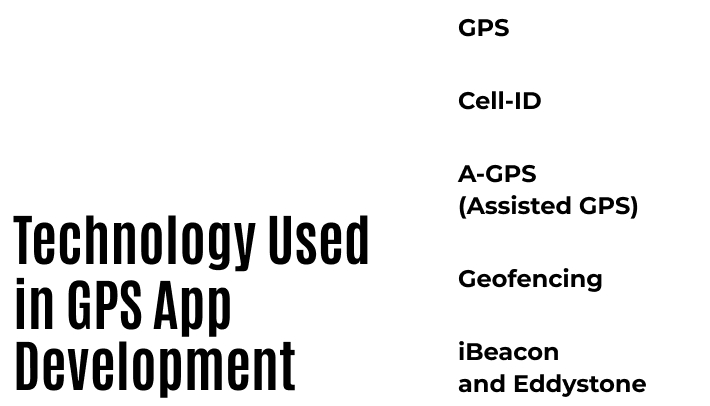
Features for Your Future Geolocation App Which You Should Use in 2023
As previously mentioned, GPS-based applications are widely used in various industries to enhance user experience. Whether you are developing a GPS tracking app for Android or iOS, it is important to focus on the key features of your geolocation app. Here are some useful features to consider if you’re interested in how to build a location tracking app successfully:
Map Integration
This feature is particularly useful for GPS navigators, transportation, and travel apps. Making this feature available offline will allow users to use the application even without an Internet connection. Dating apps also utilize map integration to show the location of potential matches.
Location Tracking
This feature is commonly used in apps to track the arrival of cabs, shipping orders, and for manufacturing companies to identify GPS coordinates for deliveries. The location tracking feature can also store data in a database for future reference. This can be useful for travelers, allowing them to easily relocate popular places they have visited.
GPS Coordinates for Fitness and Health Applications
Fitness tracking apps are gaining popularity, allowing users to track the distance and intensity of their physical activities such as running, swimming, or cycling. These apps also recognize the location of where a photo was taken and can insert it into the map.
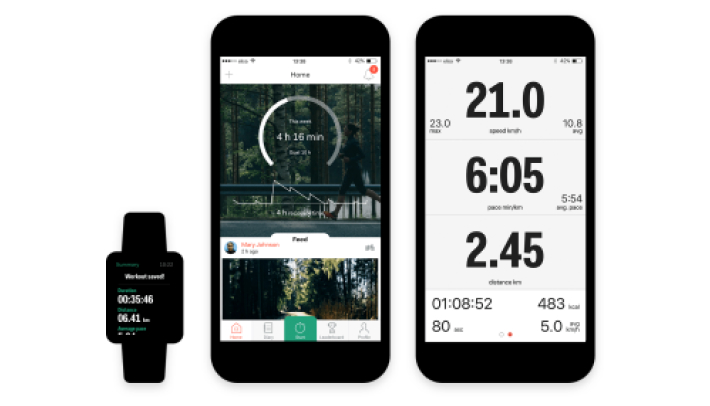
Voice Guide
This feature is particularly useful for drivers as it provides guidance without requiring them to look at their phone screens, allowing them to focus on the road. The navigator provides turn-by-turn directions and informs drivers of potential obstacles ahead. If a driver misses a turn, the system automatically generates a new route and provides directions to get back on track.
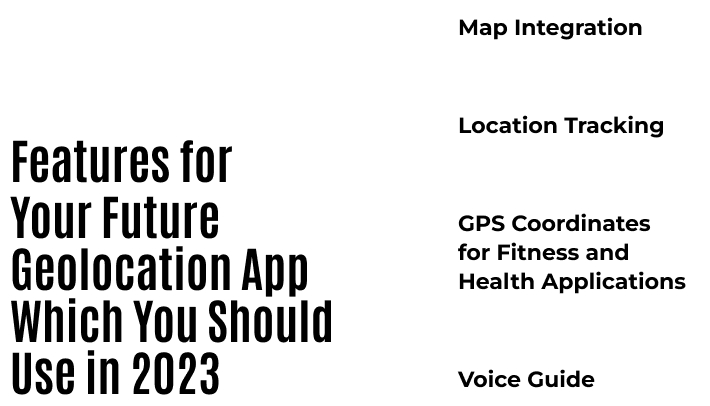
Process of GPS App Development
Let’s take a look at the steps involved in preparing and developing a GPS-based app, now that you have a basic understanding of what such an app is and why people admire them.
Plan the Project
Creating a GPS-based application requires thorough and detailed planning, including determining the tech stack, release date, requirements, team members, and other crucial aspects. According to statistics, 42% of developers worldwide consider React Native the most convenient framework for developing mobile applications. Java’s frameworks are also commonly used in app design due to their high level of security, excellent memory management features, and continuous upgrades that enable developers to keep up with the latest technologies. Engineers rely heavily on Google Maps SDK or OpenStreetMap to incorporate GPS features into the app.
Begin with the MVP of your GPS app
The Minimum Viable Product (MVP) approach allows you to test your business idea with minimal expenses. This strategy can help identify potential drawbacks, accurately budget for app development, and provide user feedback on what needs to be added or improved.
Determine the Features for Your App
As mentioned in the previous section, a range of features can enhance your GPS app and offer more value to your customers. For instance, GPS maps can save every route a driver takes, making it easier for them to revisit those locations in the future. It’s common for GPS-based apps to drain the phone battery quickly, since the app keeps the phone active. To attract more users and stay competitive, offering a battery-saving mode can be a valuable feature for your app.
Design a UI/UX that is both attractive and user-friendly
The creation of a navigation system that is both functional and easy-to-use is crucial in the development of a GPS-based Android and iOS app. Users should not be confused while navigating through the app’s buttons and search features. Ensure that your app has a unique design that provides an excellent user experience.
Form an in-house or dedicated development team
The foundation of your development project is a team of professional, experienced, and skilled IT specialists who will take care of the technical side of your app. Hiring a large team is unnecessary; a few exceptional experts, such as a UI/UX designer, web and mobile developers (1-3), QA specialists, and a project manager, can suffice. If the business owner lacks technical knowledge, consider hiring a CTO (Chief Technical Officer) responsible for maintaining and overseeing all technical matters. Hiring remote employees can significantly lower your costs while still delivering world-class development quality.
Promote, advertise, and optimize for search engines
To attract potential users during the development stage of the project, consider placing ads on upcoming GPS-drive platforms. Tell your target audience about the unique features of your product, the exclusivity they can obtain, and why they should choose your product over others. If you have promo website, SEO is probably the most effective approach to attract users to your app, in other cases, it’s ASO and social media ads.
Upgrade your app
Upgrading your app is a critical step to ensure that it stays relevant and continues to function smoothly. With each new upgrade, developers add new features and improve upon existing ones, enhancing the overall user experience. These new features may include bug fixes, security updates, and performance improvements.
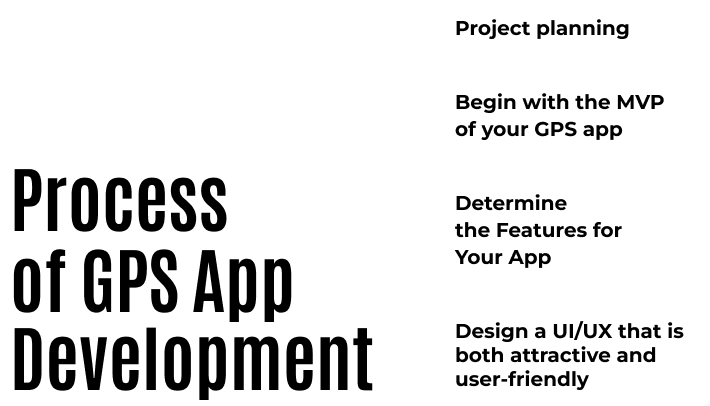
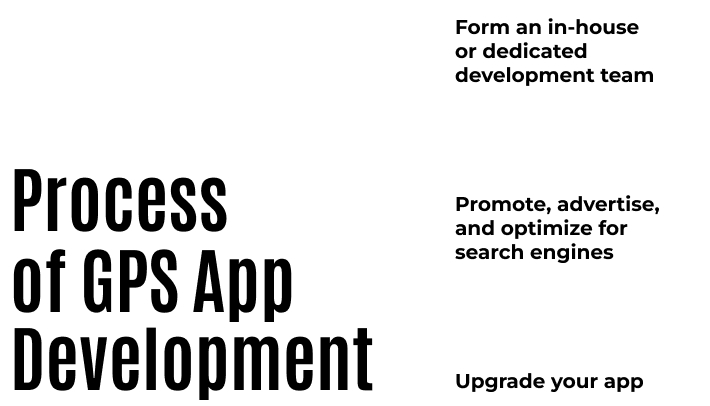
What Affect on Cost of GPS App Development
Developing a GPS app involves a range of factors that can impact the overall cost of development. Understanding these factors can help you make informed decisions and manage your budget effectively.
App Features
One of the primary factors that can affect the cost of developing a GPS app is the complexity and number of features you want to include. The more features you require, the more time and effort developers will need to invest in development, which can lead to higher costs. For instance, if you want to include features such as real-time traffic updates, voice navigation, or augmented reality, these will require more development resources, and hence increase the cost of development.
Platform
The platform you choose to develop your GPS app can also impact the cost. Developing an app for multiple platforms such as iOS and Android will require different coding languages and development tools, which can lead to different costs. If you want to ensure that your app is available on multiple platforms, you will need to budget accordingly.
UI/UX Design
The design of your GPS app is another critical factor that can impact the cost of development. A well-designed app that is easy to use and visually appealing can significantly impact user engagement and satisfaction, which can translate into higher revenue. However, the more complex and intricate the design, the higher the cost of development. Therefore, you should consider the design elements carefully and strike a balance between functionality and aesthetics.
App Security
Security is another critical factor that can impact the cost of developing a GPS app. Developing an app that can protect user data and privacy requires more time and effort, which can lead to higher costs. As such, you need to prioritize app security to ensure that users’ data is protected from unauthorized access or breaches.
Integration with Other Services
How to make a GPS navigation app without integrations? Your GPS app needs to integrate with other services such as payment gateways, social media platforms, or third-party APIs. Then the cost of development won’t increase a lot.
Development Timeframe
The timeframe for developing a GPS app can also impact the cost. If you need the app developed quickly, you may need to pay extra for expedited development services. Similarly, if you have a longer timeframe, you may be able to save costs by opting for a more extended development cycle.
Developers Location
The location of the developers can also impact the overall cost of GPS app development. Developers in certain countries or regions may offer lower rates than others, which can impact the overall cost of development. Therefore, you should consider the location of the developers carefully and balance the cost and quality of development services.
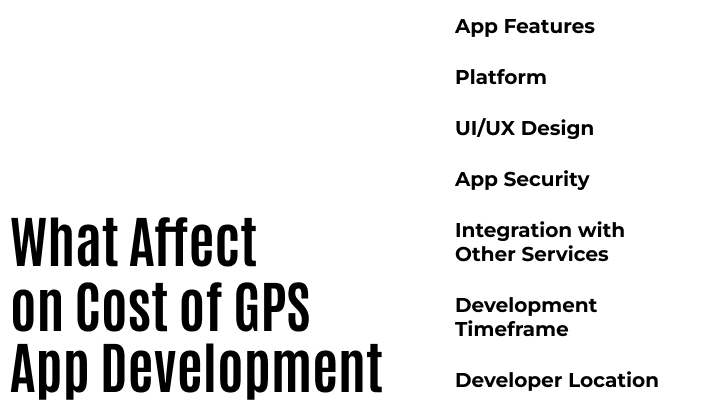
Conclusion
In the present day, GPS navigation has become a crucial aspect of our daily routines and now you know how to make a GPS app. This technology has entrenched itself into our lives to such an extent that imagining life without it seems almost impossible. As a result, it is not surprising that Waze, a GPS navigation app, has revolutionized the market. Developing an app like Waze is an intricate process that demands meticulous research and professional skills.
In case you’re looking for GPS app development company, EVNE Developers is here to help you. You can learn our cases and contact us to book free consultation.
















